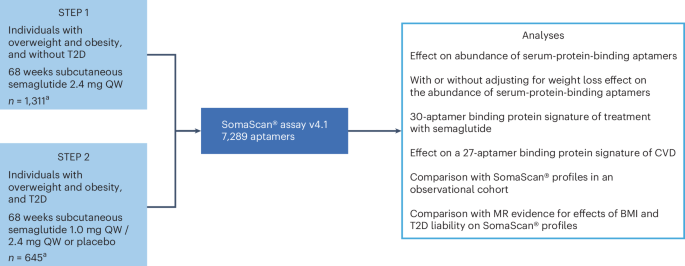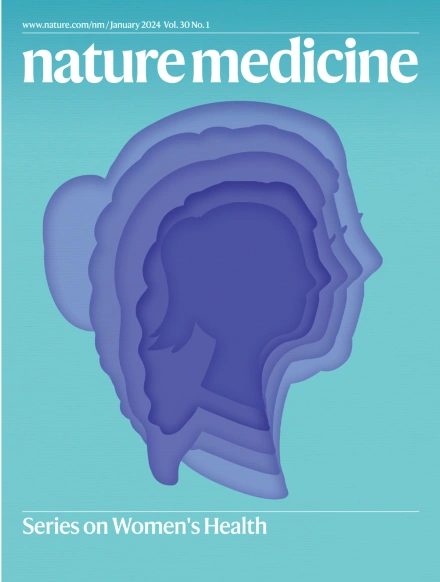肥胖患者用西马鲁肽治疗后蛋白质组学的变化
IF 58.7
1区 医学
Q1 BIOCHEMISTRY & MOLECULAR BIOLOGY
引用次数: 0
摘要
肥胖和2型糖尿病是西马鲁肽有效控制的流行慢性疾病。在这里,我们研究了semaglutide对循环蛋白质组的影响,使用来自两个3期试验的基线和治疗结束血清样本,这些试验的参与者有超重或肥胖,有或没有糖尿病:第一步(n = 1311)和第二步(n = 645)。我们发现了支持西马鲁肽广泛作用的证据,涉及与体重调节、血糖控制、脂质代谢和炎症途径相关的过程。在考虑了试验结束时体重和HbA1c的变化后,semaglutide调节了几种蛋白质,这表明semaglutide对蛋白质组的影响不仅仅是减轻体重和降低血糖。将semaglutide与真实世界的蛋白质组学特征进行比较,揭示了对疾病特异性蛋白质组学特征的潜在益处,包括下调与心血管疾病风险相关的特定蛋白质,支持其报道的降低心血管疾病风险和潜在药物再利用机会的作用。这项研究展示了从随机试验中收集的蛋白质组学数据的潜力,为了解疾病机制和药物再利用提供了机会。这些数据也强调了在未来的试验中,检测减肥药物治疗后蛋白质组学变化的需求和重要性。本文章由计算机程序翻译,如有差异,请以英文原文为准。


Proteomic changes upon treatment with semaglutide in individuals with obesity
Obesity and type 2 diabetes are prevalent chronic diseases effectively managed by semaglutide. Here we studied the effects of semaglutide on the circulating proteome using baseline and end-of-treatment serum samples from two phase 3 trials in participants with overweight or obesity, with or without diabetes: STEP 1 (n = 1,311) and STEP 2 (n = 645). We identified evidence supporting broad effects of semaglutide, implicating processes related to body weight regulation, glycemic control, lipid metabolism and inflammatory pathways. Several proteins were regulated with semaglutide, after accounting for changes in body weight and HbA1c at end of trial, suggesting effects of semaglutide on the proteome beyond weight loss and glucose lowering. A comparison of semaglutide with real-world proteomic profiles revealed potential benefits on disease-specific proteomic signatures including the downregulation of specific proteins associated with cardiovascular disease risk, supporting its reported effects of lowering cardiovascular disease risk and potential drug repurposing opportunities. This study showcases the potential of proteomics data gathered from randomized trials for providing insights into disease mechanisms and drug repurposing opportunities. These data also highlight the unmet need for, and importance of, examining proteomic changes in response to weight loss pharmacotherapy in future trials. Using serum samples collected from participants of the STEP 1 and STEP 2 trials, the authors have uncovered changes to the proteome upon semaglutide treatment, which can shed light on the mechanism of action of the drug driving its benefits in obesity-related conditions.
求助全文
通过发布文献求助,成功后即可免费获取论文全文。
去求助
来源期刊

Nature Medicine
医学-生化与分子生物学
CiteScore
100.90
自引率
0.70%
发文量
525
审稿时长
1 months
期刊介绍:
Nature Medicine is a monthly journal publishing original peer-reviewed research in all areas of medicine. The publication focuses on originality, timeliness, interdisciplinary interest, and the impact on improving human health. In addition to research articles, Nature Medicine also publishes commissioned content such as News, Reviews, and Perspectives. This content aims to provide context for the latest advances in translational and clinical research, reaching a wide audience of M.D. and Ph.D. readers. All editorial decisions for the journal are made by a team of full-time professional editors.
Nature Medicine consider all types of clinical research, including:
-Case-reports and small case series
-Clinical trials, whether phase 1, 2, 3 or 4
-Observational studies
-Meta-analyses
-Biomarker studies
-Public and global health studies
Nature Medicine is also committed to facilitating communication between translational and clinical researchers. As such, we consider “hybrid” studies with preclinical and translational findings reported alongside data from clinical studies.
 求助内容:
求助内容: 应助结果提醒方式:
应助结果提醒方式:


